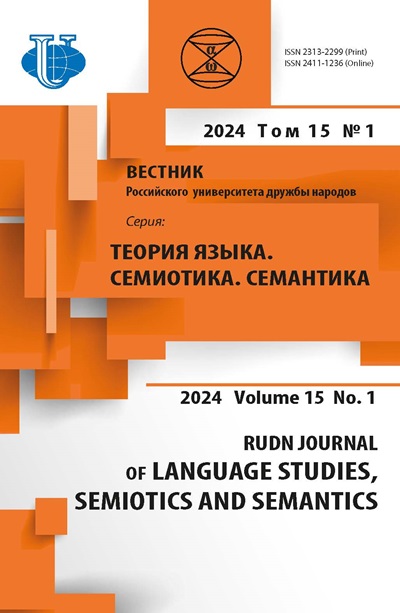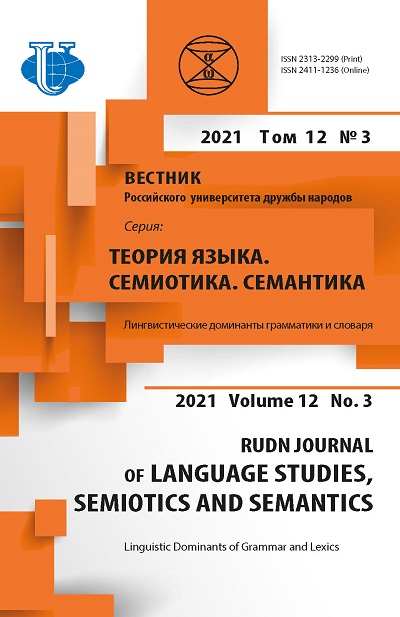«Health - disease» Conceptual Sphere: Cultural Code
- Authors: Markelova T.V.1, Novikova M.L.2
-
Affiliations:
- Institute of Modern Arts
- Peoples’ Friendship University of Russia (RUDN University)
- Issue: Vol 12, No 3 (2021): Linguistic dominants of grammar and lexics
- Pages: 848-874
- Section: THEORY, METHODOLOGY AND HISTORY OF LINGUISTICS. SEMIOTICS AND LINGUOCULTUROLOGY
- URL: https://journals.rudn.ru/semiotics-semantics/article/view/27576
- DOI: https://doi.org/10.22363/2313-2299-2021-12-3-848-874
Cite item
Full Text
Abstract
The research is focused on the conceptual, figurative and value features of « health - disease » concepts due to their permanently growing importance, reflected in the language mindset. These processes are caused by various trends leading to the increasing danger to human health: epidemics, human-induced disasters, environment pollution. Due to the relevance of the issues, the authors aim to analyse the « health - disease » conceptual sphere as a strategy to changehuman mentality and the attitude to health as a norm and a value as well as to disease as a deviation from normal life, which implies observation of values and image characteristics of concepts, revealing and describing the cultural semantics of signs. The research is designed according to the original perceptive image that every concept is based on. This image represents a vector basis in a configuration of meanings inherent in the whole conceptual sphere. The analysis of the conceptual sphere using the corpus analysis tools allowed the authors comes to the conclusion that they vary and differ within cultural functionality determined by the conceptual characteristics. Actualization of a negative or positive attitude to health and disease caused by internal and external factors reveals the dominance of the signs motivated by the external events, such as the formation of the new human health-oriented mentality and the creation of a specified conceptual sphere. The description of ambivalent concepts provided in the axiological perspective provides an opportunity to learn more about complicated conceptual spheres and explore linguistic experience objectivation, experienced knowledge quantum as well as social and group specifics in the « health - disease» conceptual sphere.
About the authors
Tatyana V. Markelova
Institute of Modern Arts
Author for correspondence.
Email: tvmarkelova@mail.ru
ORCID iD: 0000-0003-4400-6175
DSc. in Philology, Professor, first vice-rector - Vice-rector for academic of Affairs, Autonomous non-commercial Art University «Institute of Modern Arts»
27A, Novozavodskaya street, Moscow, Russian Federation, 121309Marina L. Novikova
Peoples’ Friendship University of Russia (RUDN University)
Email: novikova_ml@rudn.ru
ORCID iD: 0000-0002-4673-067X
DSc. in Philology, Professor, Russian Language Department, Institute of Law
6, Miklukho-Maklaya str., Moscow, Russian Federation, 117198References
- Stepanov, Y.S. (2001). Constants. Dictionary of Russian Culture. Moscow: Academic Project. (In Russ.).
- Karasik, V.I. (2009). Linguistic keys. Moscow: Gnosis. (In Russ.).
- Wilce, J.M. (2009). Medical discourse. Annual Review of Anthropology, 39, 199—215. (In Eng.).
- Zhura, V.V. (2008). Emotionality of “doctor-patient” communication as a communicative issue of spoken medical discourse. Proceedings of the Herzen Russian State Pedagogical University, (50), 38—44. (In Russ.).
- Grieber, Y.A. & Jung, I.L. (2018). Health and illness: color associations in contemporary Russian culture. Man and culture, (5), 32—43. doi: 10.25136/2409-8744.2018.5.23491 (In Russ.).
- Stepanova, E.S. (2020). Cognitive linguistics features of the medical myth. RUDN Journal of Language Studies, Semiotics and Semantics, 12(1), 153—164. doi: 10.22363/2313-2299-2021-12-1-153-164 (In Russ.).
- Golev, N.D. & Shpilnaya, N.N. (2012). General medical communication (types of discursive practices).). Bulletin of Kemerovo State University, 1(49), 128—137. (In Russ.).
- Humboldt, W. (1984). Selected works on linguistics. Moscow: Progress. (In Russ.).
- Sepir, E. (2001). Selected Works In Linguistics and Cultural Studies. Moscow: Progress. (In Russ.).
- Uryson, E. (2003). Problems of research on the linguistic worldview. Analogy in semantics. Moscow: Languages of Slavic culture. (In Russ.).
- Slyshkin, G.G. (2000). From text to symbol: linguistic and cultural concepts of precedent texts in consciousness and discourse. Moscow: Academia. (In Russ.).
- Ilyinskaya, T.N. (2006). History of formation and evolution of the concept “Force” in French and Russian languages [dissertation]. Tomsk. (In Russ.).
- Tokarev, G.V. (2000). Problems of linguistic and cultural description of the concept. Tula: Tolstoy State Pedagogical University of Tula. (In Russ.).
- Markelova, T.V. (1995). Semantics and pragmatics of means of evaluation in Russian. Philological Studies, 3, 67—80. (In Russ.).
- Boriskina, O.O. (2015). Corpus research of language: trend or necessity? Voronezh State University Bulletin. Series: Linguistics and intercultural communication, 3, 24—27. (In Russ.).
- Zabotkina, V. (2020). Methods of cognitive analysis of word semantics. A computer-based corpus approach. Мoscow: Languages of Slavic culture. (In Russ.).
- Gasparyan, G.R. & Chernyavskaya, V.E. (2014). Text as a discursive event. Issues in cognitive linguistics, 4, 44—51. (In Russ.).
- Gerd, А.S. (1981). Automation in lexicography and concordance dictionaries. Philological Studies, 1, 72—78. (In Russ.).
- Vorkachev, S.G. (2004). Happiness as a Linguistic and cultural Concept. Moscow: Gnosis. (In Russ.).
- Ozhegov, S.I. & Shvedova, N.Y. (2006). The Explanatory Dictionary of the Russian Language. Moscow: ITI. (In Russ.).
- Brockhaus, F.A. & Ephron, I.A. (1992). Encyclopedic Dictionary. Moscow: Terra. (In Russ.)
- Kuznetsova, E.V. (1989). Lexicology of the Russian language. Moscow. (In Russ.).
- Kuznetsov, S.A. (2008). The Newest Big Dictionary of the Russian Language. Moscow: RipolClassic. (In Russ.).
- Einstein, A. (2009). Evolution of physics. Moscow: Tidex Co. (In Russ.).
- Dahl, V.I. (2009). Proverbs of the Russian people. Moscow: Russian Language Media. (In Russ.).
- Novikov, L.A. (2001). Selected works. 1. Problems of linguistic meaning. Moscow: RUDN. (In Russ.).
- Telia, V.N. (1995). The main features of the meaning of idioms as units of the iditiomatic language composition. In: Dictionary of figurative expressions in the Russian language. Moscow: Otchizna. pp. 10—16. (In Russ.).
- Arutyunova, N.D. (1999). Language and the world of man. Moscow: Languages of Russian culture. (In Russ.).
- Apresyan, Y.D. (1986). Deixis in vocabulary and grammar and the naïve model of the world. Semiotics and informatics, 28(5), 5—33. (In Russ.).
- Potebnya, A. (1958). From notes on Russian grammar. Moscow: State Pedagogical Educational Publishing House of the Ministry of Education. (In Russ.).
- Shansky, N.M. & Bobrova, T.A. (1994). Etymological dictionary of the Russian language. Moscow: Proserpina. (In Russ.).
- Shakhovsky, V.I. (2018). Cognitive matrix of emotional and communicative personality. Russian Journal of Linguistics, 22(1), 54—79. (In Russ.).
- Morris, C.W. (1983). Foundations of the Theory of Signs. Semiotics: Anthology. Moscow: The Academic Project; Ekaterinburg: Delovaya kniga. pp. 45—97. (In Russ.).
- Vinogradov, V.V. (1995). Word and meaning as a subject of historical and lexicological research. Voprosy yazykoznaniya, 1, 5—36. (In Russ.).
- Wolf, E.M. (2009). The functional semantics of evaluation. Moscow: URSS. (In Russ.).
- Musolff, A. (2019). Creativity in metaphor interpretation. Russian Journal of Linguistics, 23(1), 23—39. doi: 10.22363/2312-9182-2019-23-23-1-23-39
- Norman, B.Y. (2004). Theory of language. Moscow: Flinta. (In Russ.).
- Shmelev, A. (2002). Russian language model of the world. Materials for the dictionary. Moscow: Languages of Slavic Culture. (In Russ.).
- Tikhonov, A.N. & Lomov, A.G. (2004). Phraseological dictionary of the modern Russian literary language. Moscow: Nauka: Flinta. (In Russ.).
- Evgenieva, A.P. (1986). Dictionary of the Russian language. Moscow. (In Russ.).
- Brileva, I.S., Volskaya, N.P. & Gudkov, D.B. (2004). Russian Cultural Space: Linguocultural Dictionary. Moscow: Gnosis. (In Russ.).
- Babenko, L.G. (2011). Dictionary of synonyms of the Russian language. Moscow: Astril, AST. (In Russ.).
- Dictionary of Russian synonyms (online version). (2012). Classes.ru. Moscow. [Electronic resource]. URL: http://www.classes.ru/all-russian/russian-dictionary-synonyms-term-79610.htm (accessed: 28.02.2021). (In Russ.).
- Zimin, V.I. (2010). Thesaurus dictionary of Russian proverbs, sayings and expressions: more than 22,000 proverbs, sayings, sayings, proverbs, sayings, proverbs, riddles, signs. Moscow: AST-Press. (In Russ.).
- Krasnikh, V.V. (2003). “At home among strangers”: A myth or reality? Moscow: Gnosis. (In Russ.).















